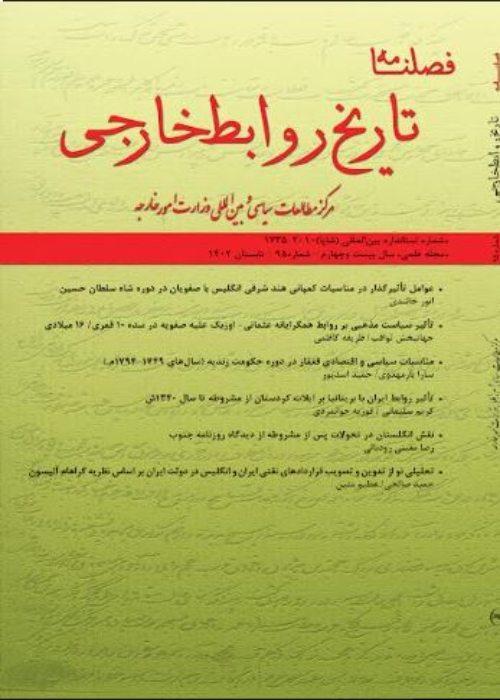Effect of Iran's Relations with Britain on the Kurdish Provinces from the Constitution until 1941
Author(s):
Article Type:
Research/Original Article (دارای رتبه معتبر)
Abstract:
After World War I, Britain apparently sought to establish an independent Kurdish state in the Kurdish territories to hold it under its support. So, this country tested various methods and took advantage of the inability of governments such as Qajar during 1917-1919. In the meantime, Iran's constitutional era, which theoretically sought to build a state-nation based on modern thought, led to Iranian ethnic and religious groups, including the Kurds, falling under the influence of Britain. In the early stages, some of the Kurds joined the constitutional convergence process. However, the government's inability to implement this theory gradually dismissed the Iranian people, including the Kurds, and foreign governments, such as the British, in the absence of the government's presence among the Kurds, interfered in Kurds affairs, and provided the basis for breakdowns with the central government. The method used in this study is the descriptive-analytical method with a historical procedure and qualitative approach based on the collection and formulation of data from library resources, newspapers, articles, and archived documents. The problem of the present study is the British influence in the Kurdistan of Iran from the constitutional period to the end of the first Pahlavi period. With the intensification of foreign intervention and the increase in power during World War I, this gap among the Kurds expanded more than ever. Iranian Kurdistan was very important from a military point of view due to its location, and because of this importance, after World War I, Some countries, especially Britain, spread the whisper of Kurdistan's independence among the Kurdish clans in order to protect their interests.After World War I, Britain apparently sought to establish an independent Kurdish state in the Kurdish territories to hold it under its support. So, this country tested various methods and took advantage of the inability of governments such as Qajar during 1917-1919. In the meantime, Iran's constitutional era, which theoretically sought to build a state-nation based on modern thought, led to Iranian ethnic and religious groups, including the Kurds, falling under the influence of Britain. In the early stages, some of the Kurds joined the constitutional convergence process. However, the government's inability to implement this theory gradually dismissed the Iranian people, including the Kurds, and foreign governments, such as the British, in the absence of the government's presence among the Kurds, interfered in Kurds affairs, and provided the basis for breakdowns with the central government. The method used in this study is the descriptive-analytical method with a historical procedure and qualitative approach based on the collection and formulation of data from library resources, newspapers, articles, and archived documents. The problem of the present study is the British influence in the Kurdistan of Iran from the constitutional period to the end of the first Pahlavi period. With the intensification of foreign intervention and the increase in power during World War I, this gap among the Kurds expanded more than ever. Iranian Kurdistan was very important from a military point of view due to its location, and because of this importance, after World War I, Some countries, especially Britain, spread the whisper of Kurdistan's independence among the Kurdish clans in order to protect their interests.After World War I, Britain apparently sought to establish an independent Kurdish state in the Kurdish territories to hold it under its support. So, this country tested various methods and took advantage of the inability of governments such as Qajar during 1917-1919. In the meantime, Iran's constitutional era, which theoretically sought to build a state-nation based on modern thought, led to Iranian ethnic and religious groups, including the Kurds, falling under the influence of Britain. In the early stages, some of the Kurds joined the constitutional convergence process. However, the government's inability to implement this theory gradually dismissed the Iranian people, including the Kurds, and foreign governments, such as the British, in the absence of the government's presence among the Kurds, interfered in Kurds affairs, and provided the basis for breakdowns with the central government. The method used in this study is the descriptive-analytical method with a historical procedure and qualitative approach based on the collection and formulation of data from library resources, newspapers, articles, and archived documents. The problem of the present study is the British influence in the Kurdistan of Iran from the constitutional period to the end of the first Pahlavi period. With the intensification of foreign intervention and the increase in power during World War I, this gap among the Kurds expanded more than ever. Iranian Kurdistan was very important from a military point of view due to its location, and because of this importance, after World War I, Some countries, especially Britain, spread the whisper of Kurdistan's independence among the Kurdish clans in order to protect their interests.
Language:
Persian
Published:
History of Foreign Relations, Volume:24 Issue: 95, 2024
Pages:
93 to 114
magiran.com/p2706466
دانلود و مطالعه متن این مقاله با یکی از روشهای زیر امکان پذیر است:
اشتراک شخصی
با عضویت و پرداخت آنلاین حق اشتراک یکساله به مبلغ 1,390,000ريال میتوانید 70 عنوان مطلب دانلود کنید!
اشتراک سازمانی
به کتابخانه دانشگاه یا محل کار خود پیشنهاد کنید تا اشتراک سازمانی این پایگاه را برای دسترسی نامحدود همه کاربران به متن مطالب تهیه نمایند!
توجه!
- حق عضویت دریافتی صرف حمایت از نشریات عضو و نگهداری، تکمیل و توسعه مگیران میشود.
- پرداخت حق اشتراک و دانلود مقالات اجازه بازنشر آن در سایر رسانههای چاپی و دیجیتال را به کاربر نمیدهد.
In order to view content subscription is required
Personal subscription
Subscribe magiran.com for 70 € euros via PayPal and download 70 articles during a year.
Organization subscription
Please contact us to subscribe your university or library for unlimited access!



